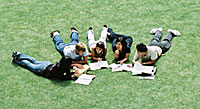 |
|
 |
| |
| |
| |
| |
| |
| |
| |
Campus: Kensington Campus
| |
| |
Career: Undergraduate
| |
| |
Units of Credit: 6
| |
| |
| |
| |
Contact Hours per Week: 3
| |
| |
Enrolment Requirements:
| |
| |
36 units of credit including 6 in Level 1 EDST or enrolment in the Diploma in Education Program
| |
| |
Excluded: EDST3908, GENT1513
| |
| |
| |
| |
| |
 |
|
 |
Description
Examines how the processes of schooling have interacted with issues of identity and diversity. Explores the historical dynamics of migration and settlement and how their growth has affected the rhetoric of Australian nationalism. How have the issues of race and culture been addressed in our schools? Discussion of how multiculturalism has influenced educational perceptions at a policy level and examination of the interpretations of that policy in the context of the public school classroom.
Learning Outcomes
On successful completion of this course, students should be able to:
- Demonstrate knowledge, recognition and understanding of social, ethnic, cultural and religious backgrounds of students and how these factors may affect learning and alternative ways of teaching and thinking
- Gain knowledge through research of the relationship between schooling and the development of multiple self-identities
- Gain knowledge in the theoretical exploration of educational reproduction and cultural capital
- Identify the inconsistency between policy and practice, especially through policies for Indigenous education
- Appreciate the historical construction of educational assimilationist practices, exclusion policies, segregation of considered as minorities
- Acquire skills in the deconstruction of government rhetoric in its effort of educational change and reform
- Become critically aware of the debates on multiculturalism, gender, race and ethnicity and the interpretation of policies in practical application in pedagogical contexts
- Acquire skills in alternative teaching methodologies which acknowledge difference in the classroom
- Gain knowledge in the fundamental goals of citizenship education and the repercussions of difference
- Develop an awareness of cultural life experiences of students/teachers in order to allow effective classroom management
- Develop practical skills in classroom relations and behaviour through new awareness in the cultural dimensions of the classroom.
Assessment
- Essay (2500-3000 words) - 30%
- Oral seminar presentation - 20%
- Exams - 50%
|

